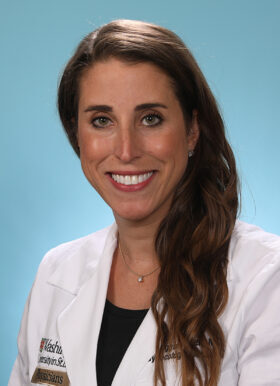
Meet Dr. Mullen! She has been with WashU for 8 years. Her current title is Assistant Professor, Division of Gynecologic Oncology, Department of Obstetrics and Gynecology.
PubMed: MARY M MULLEN, MARY REAGAN
What is your research focus?
“Chemotherapy resistance and developing novel ovarian cancer treatments that target the DNA damage response in order to improve outcomes for patients with gynecologic cancers.”
Collaborations with other research teams:
Alexandra Rutz, PhD (McKelvey School of Engineering)- Collaboration Initiation Grant (CIG) in Women’s health Technologies Abby Green, MD (Pediatric Hematologist/Oncologist)- Role of APOBEC3A in ovarian cancer Nima Mosammaparast, MD, PhD (Pathology & Immunology)- Genetic profiling of chemoresistant ovarian cancer Farrokh Dehdashti, MD; Cynthia Ma, MD; Russell Pachynski, MD- FTT-PET and association with PARP inhibitor response in patients with metastatic castration-resistant prostate cancer (mCRPC), ovarian cancer, and breast cancer William Buschser, PhD- High throughput siRNA Screen evaluating kinase and deubinqinase role in homologous recombination (HR) in HR-proficient, chemotherapy resistant high-grade serous ovarian cancer cells Brian Van Tine, MD, PhD- Arginine’s role in chemotherapy resistance in high-grade serous ovarian cancer
Why did you decide to have a career in research?
Upon treating patients with gynecologic cancers it quickly became clear that current treatments are not curing our patients of their disease, and that we as treating physicians must do better. Translation research allows us to discover more about the biology of cancer and offers opportunities for treatment and cure beyond the limits of current knowledge of this disease. It facilitates the evolution of insight from clinicians and scientists to the bench into the clinical setting and back again. What could be more exciting than this! Basic and translational research allows us as physician-scientists to not only participate and practice medicine, but to advance it in order to improve outcomes for our patients.
What do you like best about your current role?
I was initially drawn to gynecologic oncology by my interest in cancer biology and my love for the operating room. However, it was the patients and the physician-patient relationships within this field that made it clear that gynecologic oncology was my calling. A diagnosis of cancer is a journey for the patient, their loved ones, and the physician. From diagnosis to surveillance or death, the road is filled with sorrows, joys, relationships, decisions, trust, and special moments that define the voyage. Life is altered by surgery, chemotherapy, radiation, and clinical trials. As a provider, it is an honor to be a part of this intimate time in a patient’s life and enhance these experiences for our patients and to be enriched daily, both personally and professionally, from the scientific and emotional lessons these interactions provide. My passion for this field and the women we care for stimulates continued education, endless refinement of my clinical and surgical skills, and the energy to work until these women have better outcomes.
What are your most notable discoveries?
Ovarian cancer is the leading cause of death due to gynecologic malignancy and the 5th leading cause of cancer-related mortality in women. Compared to other cancers, this is an extremely deadly disease. Traditionally we give patients DNA-damaging drugs such as chemotherapy to cause tumor cell death. Although these treatments are initially effective, over 80% of women will develop tumor resistance to these agents and die within five years of diagnosis. Currently, we have no way of predicting the 20% of women whose tumors will be successfully treated with DNA damaging agents, and our strategies for increasing sensitivity to such agents are limited. My long-term goal is to evaluate the role of DNA repair in chemoresistance and to develop personalized treatment strategies to improve ovarian cancer outcomes. Currently, I am working to identify a biomarker predictive of tumor sensitivity to DNA damaging agents and to identify kinases required for ovarian cancer resistance to DNA damaging agents. In the future, I hope to use this foundational work to perform a Phase I/II clinical trial of identified kinase inhibitors. If such inhibitors work synergistically with traditional chemotherapy, we may be able to treat patients with lower doses of these drugs to avoid toxicity and increase chemosensitivity.
Personal
Tell us about your short and long-term goals!
“My long-term career goal is to become an independently funded surgeon-scientist who provides superb clinical care, leads clinically relevant translational research, and conducts independent early phase clinical trials.”
What do you like to do outside of work?
“Outside of work my favorite hobby is spending time with my two sons, Malachi and Rooney, and my husband Paddy! We enjoy biking, watching sports, and hitting up every ice-cream shop St. Louis has to offer. We love Forest Park, especially the Muny in the summer.”
What’s something that most people don’t know about you?
“I was on the boxing team in college!”
Education
2006 – 2010 Undergraduate
University of Notre Dame
Bachelor of Science, Major in Biology, Minor in Anthropology
South Bend, Indiana
2010 – 2014 Medical School
Saint Louis University School of Medicine
Doctor of Medicine
St. Louis, Missouri
June – August 2011 TL1 Predoctoral Clinical Research Program
Washington University School of Medicine in St. Louis
St. Louis, Missouri
2014 – 2018 Residency
Obstetrics and Gynecology
Washington University School of Medicine in St. Louis
St. Louis, Missouri
2018 – Anticipated 2021 Fellowship, Gynecologic Oncology
Obstetrics and Gynecology
Washington University School of Medicine in St. Louis
St. Louis, Missouri
2018 – Anticipated 2023 Masters of Science in Clinical Investigation (MSCI)
Washington University School of Medicine in St. Louis
St. Louis, Missouri
2019 – Anticipated 2022 Basics of Clinical Trials Workshop
Society of Gynecologic Oncology